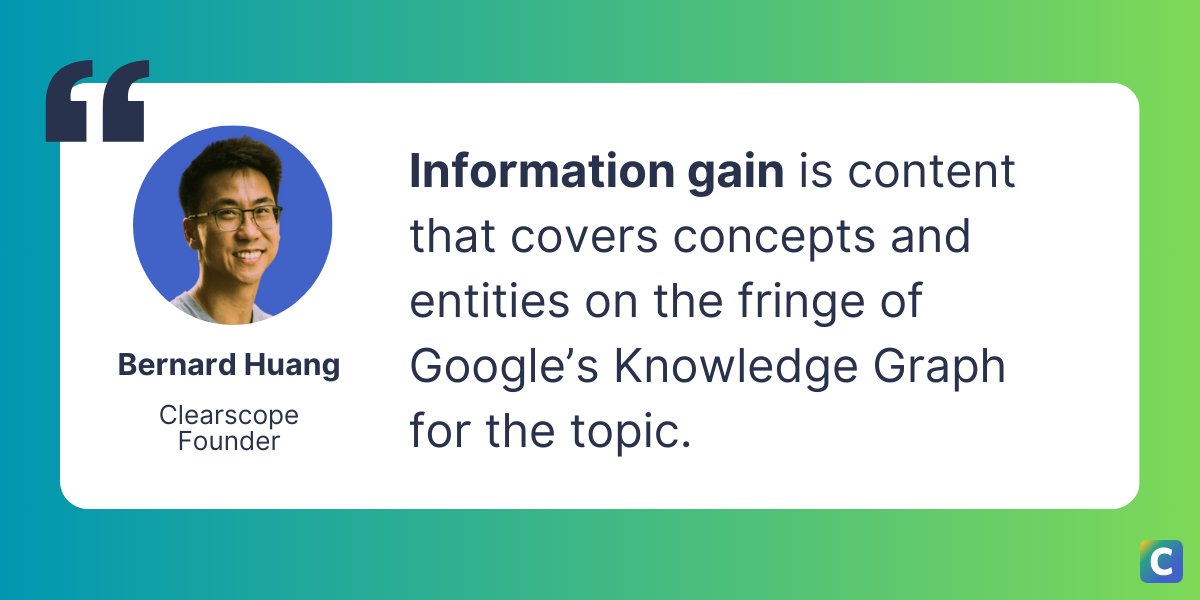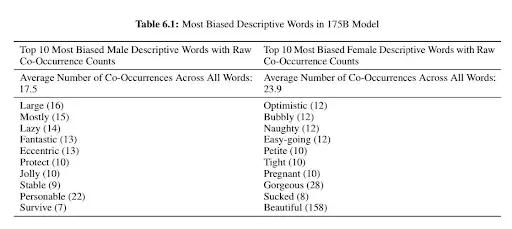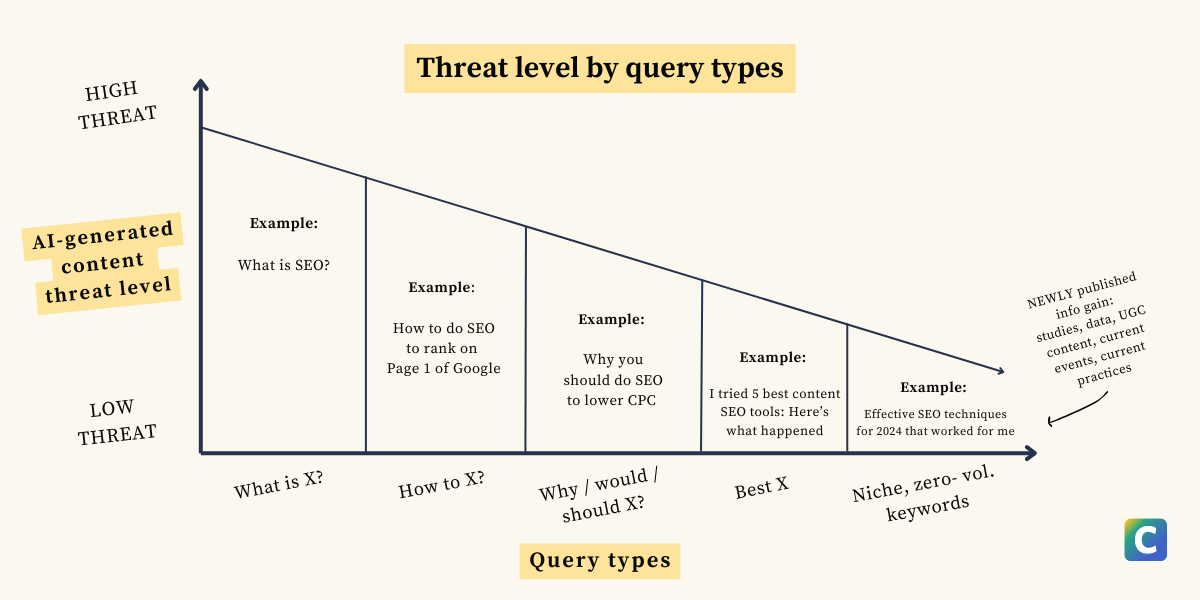Should You Use Ai-Generated Content in Your SEO Strategy?
Topic: Content Marketing
Published:
Written by: Holly Stanley
Are you wondering if AI content is bad for SEO?
Responsible AI content creation can be beneficial, but the answer to this question isn’t a simple yes or no.
Below, we’ll dig into:
Google’s actual stance on AI content generation
If the content that you’ve built with AI tools is harming your site or not
What SEO experts and influencers know already about AI generated SEO content
When AI content generation is harmful—and when it’s useful (with examples)
Is AI content bad for SEO?
AI content is not bad for SEO, as long as you’re using it responsibility and not to “game” search engines.
But ultimately, it depends on exactly how you use AI to create content, and whether or not it offers information gain. And we’ll dig into that below.
In the case of AI-generated content, it’s not a question of “do or don’t do,” but instead how to use it best, when it’s best to use it, and why.
How AI-generated content affects content marketing
AI-generated content can seem like the solution to solving time-consuming and costly components of content marketing production.
But it’s vital to think about how AI-generated content impacts content marketing on a larger scale.
AI content generators simply collect information that’s already available within its parameters—they operate on “consensus content,” or information that is widely agreed upon and generally true.
Because AI writers create content based on pre-existing information available to everyone, that means there’s no uniqueness to the content they can produce—no information gain.

At Clearscope, we define information gain SEO as content that covers concepts and entities on the fringe of Google’s Knowledge Graph for the topic.
And information gain is a crucial element to include in your content if you want it to rank in the era of AI overviews.
As AI-content generators continue to push out copycat content—and as Google’s AI Overviews feature pushes auto-answers into the top of search results—the information gain scores used by Google will help determine quality search rankings that are worth serving up to readers.
And information gain is almost always something that’s going to be rewarded by your target audience.
READ MORE:
Primary research, sometimes referred to as first-party research or first-party data, is the ultimate form of information gain and can help human-created content stand out from low-quality AI-generated content.
As content expert Ryan Law—formerly of Animalz now at Ahrefs—explains, “by adding original survey data, expert quotes, or addressing neglected parts of the topic, your content is adding brand new information to the discussion––something AI content can’t yet replicate.”
When the first few pages of Google results are all identical replicas of one another, users don’t win.
Instead of landing on a helpful result, your target audience will continue to land on copycat posts that don’t provide new information.
It’s an experience we can all relate to––typing in a search query into Google, and clicking through the first five results, only to find identical web pages.
It’s frustrating, to say the least. (Not only that, it’s really, really boring.)
Television personality Adam Savage agrees.
During the filming of his popular show One Day Build, he takes a moment to rant about Google search and its overwhelming amount of copycat listicle results for laser printers.
Instead of finding a laser printer he could use, he finds endless results that include ink-jet printers––something that has a totally different use case.
He even appeals to his viewers to send over laser printer recommendations because he can’t find what he’s looking for online.
Understandably he’s pretty incredulous that the world’s most popular search engine can’t pull up a single relevant result.
Adam Savage’s rant about Google Search doesn’t just highlight a current problem with search engines.
It also shows what the future of search increasingly looks like, especially with the advent of AI Overviews (formally referred to as Search Generative Experience, or SGE) incorporated into Google Search.
Ryan explains this is due to AI content generators picking up the best and worst of human-created content.
Since AI-generators only have existing content to fuel their output, they can’t approach any subjects with originality or innovation.
“I would say AI content is bad, but so is most human content," Ryan laments.
"If you spend any time looking at these search results for almost any query the same problems that plague AI-generated content plague human-written content. There’s a lack of narrative structure, poor evidence citation, lack of original insight and information in the content.”
On the flip side, AI writing tools have the capacity to create more articles in less time than human writers.
Surely that means brands could rank much more quickly for more keywords in less time?
We hear you.
If you’re concerned about your competitors swooping in with the latest AI-content generator and creating hundreds or thousands of articles overnight and out-ranking you and your human team of content creators, remember that most duplicate content (or consensus content) across the web won’t provide people with more value or information.
The lack of information gain may even cause AI-generated articles to fall in search rankings.
Brands can also push back against copycat AI-generated content by diversifying their content strategy and digital marketing efforts beyond SEO-driven pieces.
Ryan explains that thought leadership pieces are more original and harder for AI content generators to replicate.
“Tactical SEO content is easy for AI to replicate. Opinion, experience, and analysis are harder,” Ryan says.
“We call this thought leadership: generating awareness—and building trust—by sharing a company’s earned secrets. This can take many forms, each of which is next to impossible to create using AI alone.”
LEARN MORE: How to stand out from AI content with thought leadership
Google’s stance on AI-generated content
AI generated content has the potential to clash with Google’s existing and future Webmaster guidelines and search algorithms—but it all depends in how you’re using AI content.
On February 8, 2023, Google updated its Webmaster Guidelines to declare its focus is the “quality of the content, no matter how it’s produced” (source).
Google also notes that it buckets AI-generated content as automatically generated content.
Content spinning—a black hat SEO technique that’s considered pretty serious in Google’s opinion—is also bucketed under automatically generated content.
Although it’s important to distinguish that, unlike most spun content, AI-created text is not plagiarism—at least, not yet anyway.
Instead, AI generated content is considered original text created based on the information it has available.
We do know the search engine actively penalizes sites known to spin or copy content, but those who use responsible automatically generated content techniques to build human-first helpful content have not seen a negative impact.
READ MORE: Can you stop Google from including your content in AI overviews?
According to Google, “when it comes to automatically generated content, our guidance has been consistent for years. Using automation—including AI—to generate content with the primary purpose of manipulating ranking in search results is a violation of our spam policies…. This said, it's important to recognize that not all use of automation, including AI generation, is spam” (source).
Google’s warning is loud and clear on this one: If you’re thinking of using AI tools to generate content, do so responsibly, and proceed with caution.
Ultimately, AI does have a place in content writing––it’s just a case of using it correctly and providing a good user experience, including providing value with content that sharply aligns with search intent. Google has restated to focus on producing “original, high-quality, people-first content demonstrating qualities E-E-A-T.”
And for more details on what exactly Google is looking for in the era of AI, check out this Clearscope Webinar with Bernard Huang.
Is Google penalizing AI content after the March 2024 Spam and Core updates?
The short answer to this question is yes—if the AI generated content was unhelpful and designed to manipulate search engines.
The March 2024 Spam and Core updates targeted spam abuse, including expired domain abuse, parasite SEO, along with “scaled AI content generation” (or what we would call AI-generated content at scale, instead of AI-assisted content).
SEO expert Lily Ray made this quick video explaining what was seen after the March 2024 Google updates rolled out:
When is AI content harmful?
While it looks like AI content generators have the power to speed up your content lifecycle, they’re not always the answer.
If one-click, ready-to-publish AI-generated content sounds too good to be true, that’s because it is in most cases.
Especially if the content just isn’t great and harms user engagement metrics.
(And user engagement is key, by the way, if you didn’t know already).
From a content marketing perspective, one big drawback of AI-generated content is that it’s not totally original.
So while the content may pass a plagiarism check or be cleared for basic search engine optimization, it won’t include any original research, insights, or data.
Keep in mind, AI tools can also produce “hallucinations,” or factual errors, so they cannot be relied upon as fact-checkers. (You need humans for that!)
Ultimately, AI content is harmful when:
It’s relied on as factual information without going through a fact-checking process
It’s used as a “push button” content marketing, producing and publishing articles en masse to “game” search results
It does not connect with your target audience or provide value
It isn’t customized for brand voice or SEO best practices
In practice, this means AI-generated content can create simple pieces of text—think headlines, subject lines, meta descriptions, email drafts, etc.
But it’s incapable of sharing original opinions or creating genuine thought-leadership.
AI assistants struggle with subjects that society hasn’t formed a general consensus on—like current events or big changes in an industry—or sensitive topics, such as political and religious issues.
There’s also the issue of bias to contend with. AI also can’t tell which words or data are biased, so it’s liable to generate potentially offensive text.

AI content generation most biased descriptive words in AI (source).
Most concerningly though, GPT and AI content generations have been known to make up some quotes from people that were never said before.
That’s enough to send shivers through any journalist’s or content marketer’s spine.
When is AI content useful?
AI content is useful for answering “what is” and “how to” questions, stating factual definitions, and providing agreed-upon historical accounts of events.
AI-generated content could be compared to information that’s readily available on sites like Wikipedia.
And it’s what makes tools like ChatGPT and Google’s Gemini decent chatbots.

This graph illustrates the kind of content AI is best at creating. And with Google's AI Overviews in search results, this illustrates the likelihood AI answers can threaten organic traffic to your site for those content types.
You know when AI content really comes in clutch?
When marketers get stuck with writer's block. To save writers from staring at a blank screen, AI content tools can generate a few quick ideas.
And those quick ideas? They can form the basis of your initial research and outline.
Here’s what AI can do to enhance your content marketing:
Social copy: Emulates the style of existing posts to create on-brand social content.
Titles and headers: Turns rough content ideas into infinite heading variants.
Website copy: Generates hero copy, title variations, and value propositions.
Ideas and brainstorming: Identifies related ideas based on a starting topic.
Meta descriptions: Creates usable summaries that work well as metadata.
Feedback: Provides feedback on weak arguments (but not factual).
Rephrasing and summarizing: Generates a useful paraphrase or summary when reworking content.
Grouping like items: Useful for keyword clustering following keyword research.
Recommended reading:
Should you use AI-generated content in your SEO strategy?
Using AI-generated content can be a smart way to scale content production, especially if you have limited resources at your organization.
But keep in mind what I just touched on earlier in this article: It all depends on how you’re using AI in your content strategy and creation process.
Are you using it responsibly and in a people-first manner?
Or are you using it to game search results?
Instead of using AI to replace your human content writers or spammily climb the SERPs, consider how AI can help expand your team’s capabilities in high-quality content production.
And that’s where the difference between AI-assisted and AI-generated content comes in.
In the next article in this series, read about AI-assisted vs. AI-generated content, along with a helpful framework and list of best practices.
Contributing Authors
The original version of this article was published September 15, 2023, by guest contributor Holly Stanley. It was updated June 3, 2024, to include updated education on current best practices by the Clearscope team.
Featured image source.
5 Effective Internal Linking Strategies to Improve Your SEO
Advance your internal linking efforts by exploring several effective strategies that can help improve user experience, engagement, and SEO performance.
Read moreB2B Content Marketing Strategy: Steps to a Winning Strategy
Learn how to create a B2B content marketing strategy that doesn’t just increase brand awareness, but also drives leads, revenue, and customer loyalty.
Read moreOn-Page SEO: What it is, Why it Matters, & How To Optimize
Here’s what industry experts have to say about on-page SEO. Learn what it is, why it’s important, and how to use it to improve your organic traffic.
Read more